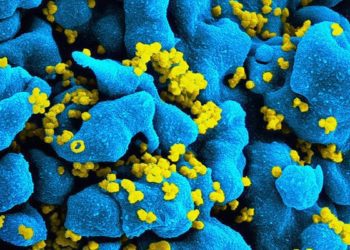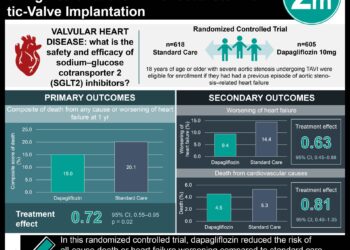Sodium-glucose cotransporter-2 inhibitors are of intermediate or low economic value in the treatment of heart failure with preserved ejection fraction
1. Sodium-glucose cotransporter-2 inhibitors (SGLT2-I) in combination with standard of care were found to increase quality-adjusted life-years at a cost of $26,000 compared to standard of care alone.
2. Amongst 1000 probabilistic models, 59.1% predicted SGLT2-I added intermediate value, and 40.9% predicted low value.
Level of Evidence Rating: 2 (Good)
Study Rundown: Sodium-glucose cotransporter-2 inhibitor (SGLT2-I) medications have become central to managing heart failure, diabetes mellitus and renal disease in recent years. Although associated with significant clinical benefits, SGLT2-I remains a proprietary medication with an annual cost of approximately $8,000 USD. The present study by Cohen et al. sought to determine the cost-effectiveness of SGLT2-I added to the standard of care management of heart failure with preserved ejection fraction.
Over 2.3 years, adding SGLT2-I to the standard of care reduced mean hospitalizations due to heart failure and increased mean survival from 7.73 to 7.95 years. Lifetime quality-adjusted life-years (QALYs) also increased from 5.27 to 5.46, with a cost increase of $26 312. The lifetime ICER of adding SGLT2-I to the standard of care was $141 200 per QALY gained. Across 1000 probabilistic iterations, this was found to be an intermediate or low-value intervention. Interestingly, if half of all eligible patients in the United States were to receive SGLT2-I therapy in addition to the standard of care, the budget for healthcare expenditures would have to increase by approximately $4.3 billion annually.
This economic analysis by Cohen et al. demonstrated that SGLT2-I medications are of intermediate cost effectiveness, increasing quality-adjusted life years by 0.19 years and associated with a cost increase of $26,300. The cost-effectiveness of this strategy would be improved by lowering medication costs and wholesale acquisition costs. A strength of this study is that clinical data were derived from two large, randomized controlled trials representing tier-one evidence. Additionally, the thoroughness of the analysis demonstrated a high degree of real-world applicability. A major limitation of this study is the inability to account for all health benefits associated with SGLT2-I, including renoprotective effects. Further studies should focus on identifying strategies to reduce costs associated with this drug class and to identify the subgroup of patients for which therapy is cost-effective.
Click here to read this study in JAMA Cardiology
Click to read an accompanying editorial in JAMA Cardiology
Relevant reading: Empagliflozin, Health Status, and Quality of Life in Patients with Heart Failure and Preserved Ejection Fraction: the EMPEROR-preserved trial
In-Depth [cost-effectiveness analysis]: A lifetime cost-effectiveness analysis from the perspective of the United States healthcare sector was conducted. A Markov model was used to predict the lifetime costs associated with adding an SGLT2-I (empagliflozin or dapagliflozin) to the standard of care for heart failure with preserved ejection fraction. Patient eligibility criteria for inclusion in the Markov model are derived from the EMPEROR-preserved and DELIVER trials. The trial duration was 2.3 years; therefore, mortality rates for this period were derived from the results of these studies; hospitalizations and risk of death from heart failure were derived from the control arm data in each.
In the EMPEROR-preserved and DELIVER trials, SGLT2-I significantly decreased hospitalizations due to heart failure (hazard ratio 0.74, 95% confidence interval 0.67-0.83) and a trend towards reduced cardiovascular death (0.88, 0.77-1.00). The base-case cost of annual SGLT2-I therapy was $4506, with sensitivity analysis scenarios ranging from $1415-6620. Finally, quality of life data was derived from the Kansas City Cardiomyopathy Questionnaire.
Over 2.3 years, adding SGLT2-I to the standard of care was found to reduce mean hospitalizations due to heart failure (from 0.74 [0.65-0.87] to 0.53 [0.44-0.63]) and increase mean survival from 7.73 (7.65-7.80) to 7.95 (7.68-8.20) years. Lifetime quality-adjusted life-years (QALYs) were also increased from 5.27 (5.22-5.33) to 5.46 (5.29-5.62), accompanied by a cost increase of $26 312 ($20 290-$31 722). The lifetime ICER of adding SGLT2-I to the standard of care was $141 200 per QALY gained. Across 1000 probabilistic iterations, this was found to be an intermediate (59.1%) or low (40.9%) value intervention.
Image: PD
©2023 2 Minute Medicine, Inc. All rights reserved. No works may be reproduced without expressed written consent from 2 Minute Medicine, Inc. Inquire about licensing here. No article should be construed as medical advice and is not intended as such by the authors or by 2 Minute Medicine, Inc.







